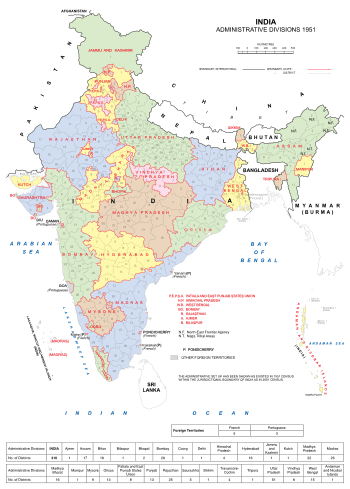1952 Delhi Legislative Assembly election
The first Delhi Legislative Assembly election to the Delhi Legislative Assembly was held on 27 March 1952.[1][2] Forty-eight seats were up for election.[2] Six of the constituencies elected two assembly members, the remaining 36 constituencies elected a single member.[1]
| ||||||||||||||||||||||||||||
All 48 seats to the Delhi Legislative Assembly 25 seats needed for a majority | ||||||||||||||||||||||||||||
|---|---|---|---|---|---|---|---|---|---|---|---|---|---|---|---|---|---|---|---|---|---|---|---|---|---|---|---|---|
| ||||||||||||||||||||||||||||
| ||||||||||||||||||||||||||||

Results
Congress emerged as the single largest party in the first legislative elections held in Delhi.[1] Chaudhary Brahm Prakash of Indian National Congress was elected Chief Minister.
| Political Party | Flag | Seats Contested | Won | % of Seats | Votes | Vote % | |
|---|---|---|---|---|---|---|---|
| Indian National Congress | 47 | 39 | 81.25 | 2,71,812 | 52.09 | ||
| Bharatiya Jana Sangh | 31 | 5 | 10.42 | 1,14,207 | 21.89 | ||
| Socialist Party | 6 | 2 | 4.17 | 12,396 | 2.38 | ||
| Akhil Bharatiya Hindu Mahasabha | 5 | 1 | 2.08 | 6,891 | 1.32 | ||
| Independent | 78 | 1 | 2.08 | 82,972 | 15.90 | ||
| Total Seats | 48 | Voters | 7,44,668 | Turnout | 5,21,766 (58.52 %) | ||
State Reorganization
On 1 November 1956, under States Reorganisation Act, 1956, Delhi was made a Union Territory under the direct administration of the President of India and the Delhi Legislative Assembly was abolished simultaneously.[3] Next legislative assembly elections in Delhi were held in 1993, when Union Territory of Delhi was formally declared as National Capital Territory of Delhi by the Sixty-ninth Amendment to the Indian constitution.[4]
References
- "Statistical Report on General Election, 1951 : To the Legislative Assembly of Delhi" (PDF). Election Commission of India. Retrieved 11 March 2014.
- Kaushik, S. L.; Rama Patnayak (1995). Modern Governments and Political Systems. Vol. 3. New Delhi: Mittal Publications. p. 65.
- "Reorganisation of States, 1955" (PDF). The Economic Weekly. 15 October 1955. Retrieved 25 July 2015.
- "Sixty-ninth amendment". Delhi Assembly official website. Archived from the original on 21 August 2016.